Goodnow27s Politics and Administration古德诺政治与行政二分
九年级英语名人传记阅读理解与启示提炼单选题50题
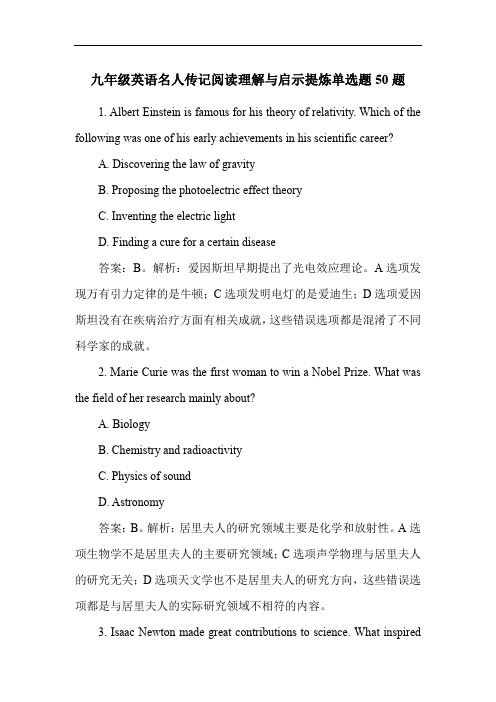
九年级英语名人传记阅读理解与启示提炼单选题50题1. Albert Einstein is famous for his theory of relativity. Which of the following was one of his early achievements in his scientific career?A. Discovering the law of gravityB. Proposing the photoelectric effect theoryC. Inventing the electric lightD. Finding a cure for a certain disease答案:B。
解析:爱因斯坦早期提出了光电效应理论。
A选项发现万有引力定律的是牛顿;C选项发明电灯的是爱迪生;D选项爱因斯坦没有在疾病治疗方面有相关成就,这些错误选项都是混淆了不同科学家的成就。
2. Marie Curie was the first woman to win a Nobel Prize. What was the field of her research mainly about?A. BiologyB. Chemistry and radioactivityC. Physics of soundD. Astronomy答案:B。
解析:居里夫人的研究领域主要是化学和放射性。
A选项生物学不是居里夫人的主要研究领域;C选项声学物理与居里夫人的研究无关;D选项天文学也不是居里夫人的研究方向,这些错误选项都是与居里夫人的实际研究领域不相符的内容。
3. Isaac Newton made great contributions to science. What inspiredhim to study gravity?A. A falling appleB. A flying birdC. A running horseD. A floating cloud答案:A。
高考英语大一轮复习 第1 模块考点复习 U

毛额市鹌鹑阳光实验学校Unit 11 The Media[对应学生用书P65]话题:新闻报道话题单词1.accurate /ækjʊrət/ adj.正确的;精确的2.rewarding /rΙwɔːdΙŋ/ adj.有回报的3.acquire /əkwaΙə/ vt.取得;获得;学到4.appointment /əpɔΙntmənt/ n.约会;任命5.journalist /dʒɜːnəlΙst/ n.记者6.concentrate /kɒnsəntreΙt/ vt.集中;聚集7.case /keΙs/ n.事实;事例;案件8.fundamental /fʌndəmentəl/ adj.基本的9.course /kɔːs/ n.路线;方向;过程rm /Ιn fɔːm/ vt.告知;告诉11.update /ʌp deΙt/ vt.更新12.eager /iːɡə/ adj.热心的;热切的13.edition /ΙdΙʃən/ n.版;版本14.gifted /ɡΙftΙd/ adj.有天资的;有天赋的15.intention /Ιn tenʃən/ n.意图;目的16.meanwhile /miːnwaΙl/ n.& adv.同时;其间话题短语1.concentrate on 全神贯注于rm sb.of sth. 告知某人某事3.take a photograph 拍照 4.keep up with 跟上5.ahead of time 提前 st of all 最后7.be eager to do 渴望做 8.current affairs 时事9.be/get absorbed in 专心于 10.set to work 开始工作11.cover/go on a story 去采访12.tell the truth 说出真相13.look forward to 期待 14.make an appointment 约会15.work experience 工作经验16.arrange an interview 安排采访话题句型1.Being a journalist,you need to keep up with the current affairs and be devoted to writing.作为一个记者,你需要紧跟时事,并致力于写作。
四级英语阅读训练及答案
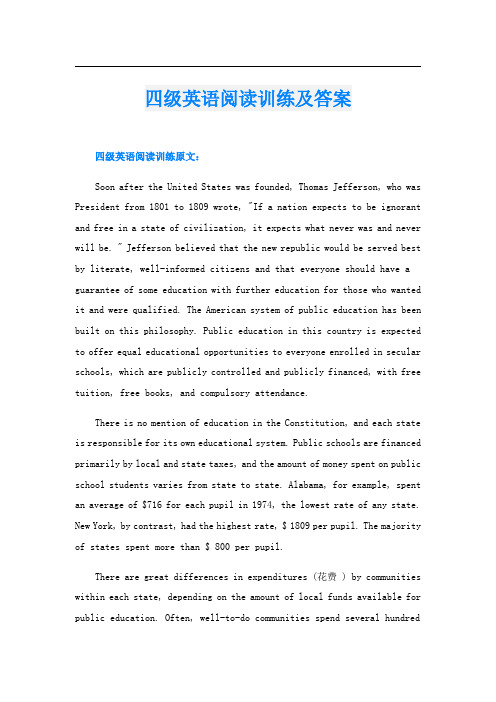
四级英语阅读训练及答案四级英语阅读训练原文:Soon after the United States was founded, Thomas Jefferson, who was President from 1801 to 1809 wrote, "If a nation expects to be ignorant and free in a state of civilization, it expects what never was and never will be. " Jefferson believed that the new republic would be served best by literate, well-informed citizens and that everyone should have a guarantee of some education with further education for those who wanted it and were qualified. The American system of public education has been built on this philosophy. Public education in this country is expected to offer equal educational opportunities to everyone enrolled in secular schools, which are publicly controlled and publicly financed, with free tuition, free books, and compulsory attendance.There is no mention of education in the Constitution, and each state is responsible for its own educational system. Public schools are financed primarily by local and state taxes, and the amount of money spent on public school students varies from state to state. Alabama, for example, spent an average of $716 for each pupil in 1974, the lowest rate of any state. New York, by contrast, had the highest rate, $ 1809 per pupil. The majority of states spent more than $ 800 per pupil.There are great differences in expenditures (花费 ) by communities within each state, depending on the amount of local funds available for public education. Often, well-to-do communities spend several hundreddollars more for each child than poorer towns nearby do. These figures reflect differences in expenditures . for such items as teachers salaries, the purchase of books, and school construction and maintenance.Despite these differences, there is general uniformity in the organization and curricula of public schools throughout the country. Each state is divided into local school districts. Usually a state department of education sets the general requirements that local communities or school districts must meet. Local school boards, usually elected by members of their communities, are responsible for the detailed organization and operation of their schools. This-responsibility includes hiring teachers and administration and setting their salaries.The twelve years of public school education usually begin when a child is six years old. Some school systems are divided into eight years of primary school and four years of secondary school. Primary schools are often called elementary schools, and secondary schools are called high schools. Many systems combine the last two years of elementary school and the first year of high school in what is known as junior high school. This is followed by three years of senior high school. A large number of school systems also have a kindergarten program that provides one year of preschool training for five-year-old children before they begin the formal school years. The academic year lasts nine months, from September to June, with winter and spring vacations. Classes are held five days a week, from Monday through Friday.Elementary schools are usually organized on a neighbourhood basis. Children living in the same area attend a school that is close to their homes. High schools, on the other hand, serve children from many differentelementary schools, and a single high school often has several thousand students from various parts of the community. Many towns have just one high school. In rural areas one elementary school frequently serves the children from several communities. When schools are located beyond convenient walking distance, children are transported free of charge in bright yellow school buses. Today more than 40 percent of all American school children are bused to and from school daily.It took many years for Jeffersons dream of education for everyone to approach reality. In 1870 only slightly more than half of all children of school age attended school. It was not until 1918 that every state had a compulsory school-attendance law. Today most states require the attendance of all children between the ages of six and sixteen. Approximately 99 percent of all American children of elementary school age (six through thirteen) and 94 percent of high school age (fourteen through seventeen) go to school.The quality of education has changed as the record of school attendance. For example, in a typical mid-nineteenth century elementary school class children sat in one place in one position for hours on end, with periodic arm swinging for exercise and perhaps occasional permission to go to the bathroom. The method of instruction was catechism (questions by the teacher with memorized responses by the students).. . The teacher fed the stuff out one day, and wanted it back the next, in her own words.Emphasis was on good behavior and learning what were called "the three Rs"—reading, riting and rithmetic. Most of the teachers had no more than elementary school education themselves.In the modern elementary school, in addition to the study of reading, writing, arithmetic, and language arts (including spelling), children are taught social studies (history, geography, and civics or government) science, art, and music. They are. often also taught cooking and manual skills such as carpentry and sewing. Outdoor playgrounds and indoor gymnasiums offer opportunities for lots of physical exercise.Modern teaching theories and methods vary greatly, but they frequently reflect the influence of John Dewey, an importanttwentieth-century educator and philosopher. Dewey believed that education should be more concerned with the interests and needs of each child than with the particular subjects that the child is taught. Today many teachers try to give considerable attention to the personal development of each individual student, especially at the elementary school level.Entrance to high school is automatic when a student completes elementary school. No examinations are required. High schools usually offer courses in English literature and composition, the social sciences, mathematics, laboratory sciences, and foreign languages as well as art, music, and physical education. After completing certain basic requirements, students are often permitted to choose the subjects that best suit their plans for college or for work after graduation.Extracurricular activities including clubs, school newspapers and magazines, and sports are important features of high-school life. In addition, student representatives, elected by their fellow students, often work with school officials in planning school policies. Thisarrangement is an effort to encourage students interest inself-government and in their responsibilities as citizens.Most high schools are organized on what is called a comprehensive basis, which means that programs in academic (college preparatory), vocational, and general education are offered in the same school. In some large cities specialized high schools concentrate on just one type of program. In addition, many communities provide programs for handicapped children (children who are deaf, blind, crippled, emotionally disturbed, or mentally retarded) and children who are specially gifted, intellectually or artistically.四级英语阅读训练题目:1. In American system of public education, everyone is expected to have equal educational opportunities, which is defined in the U. S. Constitution.2. The amount of money spent on public school students depends mainly on local and state taxes.3. The organization and curricula of public schools have much in common throughout the country.4. All students can take yellow school buses to school in some states.5.Both school attendance and the quality of education have been greatly improved today.6.All children between the ages of five and eighteen are required to attend school in most states.7.There are much higher requirements for public school teachers today than in the past.8.Students can get well prepared for college study in_______________9.Modern teaching theories and methods are generally influenced by_________________10. Children may have one year of before they start elementary school years.四级英语阅读训练答案:I. N 2. Y 3. Y 4. N 5. Y 6. N 7. NG8. comprehensive high schools 9. John Dewey 10. preschool training。
英语速记单词

art艺术家,ill病了。因为胡子多影响 呼吸,所以用大炮轰他一下,胡子就没 了,病就好了
60
context
['kɔntekst]
n. 上下文,环境,背景
con共同,text编织-共同编织上下文
第 6 页,共 15 页
61
emphasize
['emfəsaiz]
vt. 强调,着重
62 63 64 65 66 67 68 69 70 71 72 73 74 75 76 77 78 79 80 81 82 83 84 85 86 87 88 89 90 91 92 93 94 95 96
n. 大使
第 4 页,共 15 页
46
amend
[ə'mend]
v. 修正,改进
47
ammunition
[.æmju'niʃən]
n. 军火,弹药 弹药 军火,军需品 [喻]攻击[防御]手段 投掷[射击]物 an非,无,arch统治-没有统治-无 政府 an=ante行走,前进+cest=cess+or →走在前面的人→祖先;祖宗
英 语 词 汇 速 记 手册
序号
4
单 词
abbreviate
读 音
[ə'bri:vieit]
释 义
vt. 缩写,缩短,使 ... 简略 vt. 正式放弃(权利或责任 等),让位 vi. (国王)退位,辞职 n. 腹部
词 根
brev短;参:brevity(n 简短) ab远离,dic宣布,说话,命令-宣布 远离,远离命令-退位ab远离, dicate=dictator(n 独裁者)-放弃 权力 Ab离开,do做,men人。不作事的人 。经常久坐的人,腹部自然长肉啦!另 记:bd,像不像两个挺着肚子的men?
必修1根据所给汉字意思为英文单词选择一个准确的译义

必修1根据所给汉字意思为英文单词选择一个准确的译义篇一:重大版高中英语必修1单词英译汉重大版高中英语必修1单词表英译汉 Unit2 ReadingWords for Production quiz pronunciation pronouncealoud dialect upsettotal scoreappropriatecomment probably probable analytic accurate suggestion suggest firstly secondlythirdly finallyrelaxed communicate organize regular regularly mixture mix descriptionovercome observeWords for Recognition exertutmost Phrases and Expressions become aware oflearner type be as accurate as possibleall the timeas often as possible worry too much about be afraid to work hardlose interest in different ways at different timesdepend onexert … to the utmostgenerally speaking be divided into Listening and Speaking in deep thought be eager toexperiment with structure graspindependent independence entirely entireGrammar and Writing notebook weekly weekly following realistic unexpectedlyflexible taskFurther Reading Words for Production brain1television vocabularygrammar composition Email phrase tenseautomatically automatic gradually native magicWords for Recognition intuitionPhrases and Expressions a large number ofwith the help ofbecome part ofthousands ofthrow awayUnit 3 Reading Words for Production human beingeasygoing goodlookingwarmheartedhardworkingjuniorJunior middle school schoolmateunbelievablebelievebelievableattitudeimpressdevotiondevoteexplanationexplainloudnessloudmusicalenjoyableenjoybesidesimaginativeimagineaidpaintingpaintpainterrecordingrecordflashflash cardcoursebookrangechallengeWords for Recognition unsungtonechucklegrammaticalfurthermorePhrases and Expressions as good asquite a lot ofbe kind tobe crazy about/onchange one’s attitude toward act outaccording toat leastsense of humourhelp sb to do sthrange from … to…can’t wait to doGrammar and Writing boredvillagertell a lieinformalcasualListening and Speakin give upway outIn the end shove allslightslightlygreatlycontraryon the contraryfind bones in an eggdiscourageddiscourageFurther Readingqualitypersonal qualityacceptattractiveattractcloselycloserelatedabilitytolerantindeedweaknessskillpatienceperfectmain2mainlymethodsexWords for Recognition sympatheticcharmcooperationPhrases and Expressions closely related tothe ability to do /bebe tolerant ofmake mistakesa bit ofevery now and thena matter ofbe born likedeal withbe perfect inUnit 4 Reading nestwebwhispercheatingcheatbelieftapmadguarddestroygentlygentbreathebreathrelievedreliefrelievelungWords for Recognition spiderleancurlPhrases and Expressions keep one’s eyes onfollow a rulerule breakerthink to oneselfgo againsta way out offor a momentin silencesearch forGrammar and Writing waste dustbinmidnightwritingspellingpunctuationListening and Speaking encouragementmidtermmidterm exam preparedfeel very prepared for so farfinalfinal examstay up all night studying cheer upFurther Reading noblesoundlyintendreducecontraryemergencyambulancevehicleaccompanyfortunatelyfortunateoperationtreatmenttreatarrangeWords for Recognition groaninsomniadaytimecheckupdiagnosisappendicitistimelydaybreakPhrases and Expressions be awakened byintend to dofall asleeptide overif onlyin no timemedical workersaccompany sb togo throughall kinds ofin timeget timely treatmentat daybreakprepare oneself forChallenging Yourself II Reading politics 3biologyITlabourconsistmanagementmanagepassingpassaverageacceptableextremely extremesquirreleaglestrictly strictinsistscholarshipscholarWords for RecognitionwebbedworntreetopdisciplineeelPhrases and Expressions once upon a time set upconsist ofbe very poor instay after schoolin order topass a test/ an examworry aboutleave school instead ofin the endinsist onbecause ofat the end ofFurther Reading bachelormasterdoctor administrationdevelopeda developed countryeducatedcitizensystemunfairadvantagenurseryprimaryprimary schoollecturerlectureparticularenabledesignWords for Recognition philosophysecondarysecondary schoolcareerPhrases and Expressions provide sth for sbbe useful toagree withenter a schoolhave a chance of doing stha number ofsuch ason the other handenable sb to do sthUnit 5 ReadingWords for Production gain pot poleimperfection imperfect perfect load effort warmfailurefail decorate strengthstrongWords for Recognition crack crackedflawPhrases and Expressions full ofat the end ofone and a half be proud ofbe ashamed of leak out all the way because of feel sorry for take notice of on the side of know about take advantage ofin some aspect go to waste be afraid of4Listening and Speaking melt carry on cast … aside survive reach out within emptiness empty Lord knows tear … away hold onGrammar and Writing the passive voice avoid mention the active voice fridge subject object invite destroy forest Indonesia punishFurther Reading Words for Production confident confidence opportunity eventually reasonable reason goal stranger strange complain immediatelyimmediateWords for Recognition criticism objectively karaokePhrases and Expressions get started provide sb. with speak one’s mind agree with complain about put oneself /sb. from find outkeep in touch with in public deal with take up get better atas time goes byUnit 6 ReadingWords for Production condition grateful spread satisfy unwanted unloved terrified terrify hurt unbearable bearable bear naturally natural nature mankind suffering Ireland organization operate surveyrankWords for Recognition conscience poverty nun charity Phrases and Expressions pick up take care ofdraw a little attention to shut out throw outListening and Speaking correctly correct move in be of helpmilkman come to tea look forward to Grammar and Writing lovingly salutationChallenging Yourself III ReadingWords for Production honesty honest policy slip guilty5guilt forgiveness delivery acquaintanceroof missile smooth headscared scare misfortune fortune fortunate presence calculate cover envelope freedom free cookie Words for Recognition route backyard comet slotPhrases and Expressions give sb a lesson pass on to shoot out fall from let sth/sb go head straight for at the sound oftake off from fly off be scared about get caught be concerned about篇二:必修14词语检测必修1词语检测说明:1. 全卷共100道试题,每题1分;2. 答题时间:90分钟。
2009年7月27日希拉里-美中战略与经济对话会议开幕辞3700字
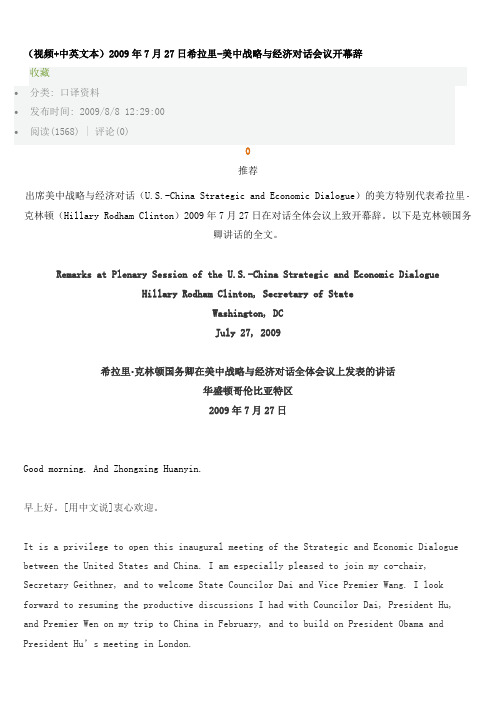
(视频+中英文本)2009年7月27日希拉里-美中战略与经济对话会议开幕辞收藏∙分类: 口译资料∙发布时间: 2009/8/8 12:29:00∙阅读(1568) | 评论(0)推荐出席美中战略与经济对话(U.S.-China Strategic and Economic Dialogue)的美方特别代表希拉里∙克林顿(Hillary Rodham Clinton)2009年7月27日在对话全体会议上致开幕辞。
以下是克林顿国务卿讲话的全文。
Remarks at Plenary Session of the U.S.-China Strategic and Economic DialogueHillary Rodham Clinton, Secretary of StateWashington, DCJuly 27, 2009希拉里∙克林顿国务卿在美中战略与经济对话全体会议上发表的讲话华盛顿哥伦比亚特区2009年7月27日Good morning. And Zhongxing Huanyin.早上好。
[用中文说]衷心欢迎。
It is a privilege to open this inaugural meeting of the Strategic and Economic Dialogue between the United States and China. I am especially pleased to join my co-chair, Secretary Geithner, and to welcome State Councilor Dai and Vice Premier Wang. I look forward to resuming the productive discussions I had with Councilor Dai, President Hu, and Premier Wen on my trip to China in February, and to build on President Obama and President Hu’s meeting in London.十分荣幸能在美中两国之间的战略与经济对话首次会议开幕式上致辞。
公共管理英语[修订版]_顾建光_全文翻译Unit
![公共管理英语[修订版]_顾建光_全文翻译Unit](https://img.taocdn.com/s3/m/7ac53864e45c3b3567ec8bdc.png)
Why Public Management Reform?为什么要进行公共管理改革?Public management reform is usually thought of as a means to an end, not an end in itself. 公共管理改革通常被认为是一种达到目的的手段,而并非目的本身。
To be more precise we should perhaps say that it potentially a means to multiple ends. 更准确说,我们可以认为它是一种潜在地达到多种目的的手段。
These include making saving (economies) in public expenditure, improving the quality of public services, making the operation of government more efficient, and increasing the chances that the policies which are chosen and implemented will be effective. 这些目的包括:节约公共开支(经济),提高公共服务的质量,使政府的运作更加有效,增加被选用的和实施的政策变得有效的机会。
On the way to achieving these important objectives, public management reform may also serve a number of intermediate ends, including those of strengthening the control of politicians over the bureaucracy, freeing public officials1 from bureaucratic constrains which inhibit their opportunities to manage and enhance the government’s accountability to the legislature and the citizenry for its policies and programs. 在实现这些重要目标的同时,公共管理改革还可能为一系列中间目标提供服务,包括强化政治家对官僚的控制和把公务员从官僚政治的束缚中解放出来,这些束缚阻碍了他们在政策和计划实施1公务员、国家公职人员、政府官员中管理和提升政府对立法部门和公民所负责任的机会。
美国公共行政学百年回顾二

美国公共行政学百年回顾二消息是:尽管私有化对于校正公共部门的缺陷并非灵丹妙药,但私有部门的确给公共项目带来更有效率和更负责任的真正机会;私有化的坏消息是:政治压力可能导致私有部门能干得更好的事让公共部门干,由公共部门干更适合的事反而让私有部门去做。
组织思想的演变:女性的观点到1990年,妇女在公共部门中的比例达到60%。
妇女参与公共事务存在两大问题:一是工资偏低;二是所谓的“天花板效应”——即高层管理阶层的妇女比例偏低。
笔者曾经做过计算,按照二十世纪的发展趋势,要达到国会中男女数量平等需要400年。
女权主义组织分析家安克尔(Joan Acker)在《性别组织理论》(1992)一书中认为,长期男性对组织的控制导致了组织理论的男性观点:1.男女分工产生了男女不同的工作类型;2.创立了男性组织标志和形象;3.男女的关系是领导与被领导的关系;4.由于组织内男女分工和机会不均,不同性别应有不同行为和态度的观点逐渐成为心理和思维定势。
对组织和管理的女性观点将会对公共行政学产生深刻的影响。
公共行政学的女权主义理论家斯蒂夫(Camilla Stivers)在《公共行政中的男女形象:合法性与行政国》(1993)中说,“只要行政领域被看成与性别无关,妇女就将面对目前的霍布森(Hobson)选择,即或是接受男性行政标志,或是接受官僚体制中靠边站的地位”。
机构前景:官僚体制改革还是质量改善的继续?在二十世纪九十年代,新的管理见解对组织机构应当如何被管理、下属应当如何被指导、政府项目的消费者应当如何被对待等问题有重大影响。
1992年,巴泽勒(Michael Barzelay)与阿摩亚尼(Babak Armajani)发表《突破官僚制:政府管理的新视野》。
该书基于在明尼苏达州的革新实验,即通过强调顾客服务、给雇员授权、有选择性的竞争和减少行政规章制度而改变公共项目。
两位作者认为,政府不应当是官僚型、规章制度约束、强调控制和没有灵活性,他们向韦伯型的传统组织结构和运作机理提出了挑战。
新世纪大学英语系列教材综合教程4英语课后题答案(含原句)及整句翻译短语填空(1)
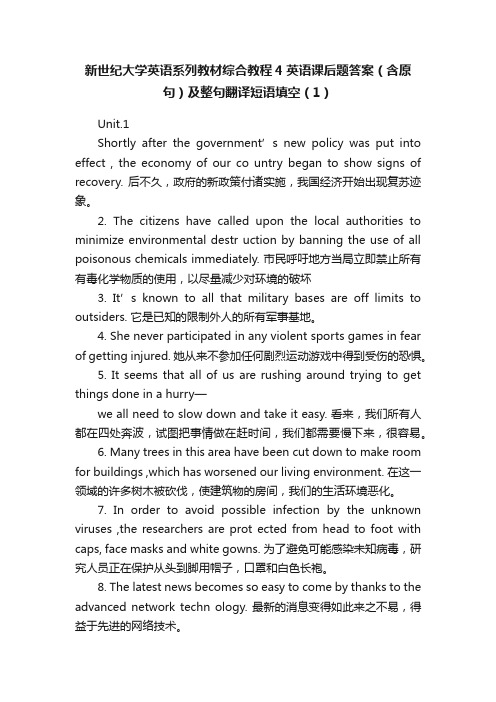
新世纪大学英语系列教材综合教程4英语课后题答案(含原句)及整句翻译短语填空(1)Unit.1Shortly after the government’s new policy was put into effect , the economy of our co untry began to show signs of recovery. 后不久,政府的新政策付诸实施,我国经济开始出现复苏迹象。
2. The citizens have called upon the local authorities to minimize environmental destr uction by banning the use of all poisonous chemicals immediately. 市民呼吁地方当局立即禁止所有有毒化学物质的使用,以尽量减少对环境的破坏3. It’s known to all that military bas es are off limits to outsiders. 它是已知的限制外人的所有军事基地。
4. She never participated in any violent sports games in fear of getting injured. 她从来不参加任何剧烈运动游戏中得到受伤的恐惧。
5. It seems that all of us are rushing around trying to get things done in a hurry—we all need to slow down and take it easy. 看来,我们所有人都在四处奔波,试图把事情做在赶时间,我们都需要慢下来,很容易。
6. Many trees in this area have been cut down to make room for buildings ,which has worsened our living environment. 在这一领域的许多树木被砍伐,使建筑物的房间,我们的生活环境恶化。
language policy
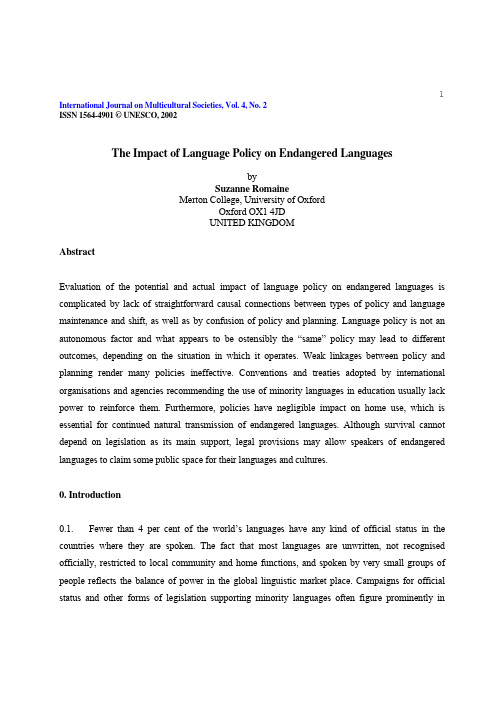
1 International Journal on Multicultural Societies, Vol. 4, No. 2ISSN 1564-4901 © UNESCO, 2002The Impact of Language Policy on Endangered LanguagesbySuzanne RomaineMerton College, University of OxfordOxford OX1 4JDUNITED KINGDOMAbstractEvaluation of the potential and actual impact of language policy on endangered languages is complicated by lack of straightforward causal connections between types of policy and language maintenance and shift, as well as by confusion of policy and planning. Language policy is not an autonomous factor and what appears to be ostensibly the “same” policy may lead to different outcomes, depending on the situation in which it operates. Weak linkages between policy and planning render many policies ineffective. Conventions and treaties adopted by international organisations and agencies recommending the use of minority languages in education usually lack power to reinforce them. Furthermore, policies have negligible impact on home use, which is essential for continued natural transmission of endangered languages. Although survival cannot depend on legislation as its main support, legal provisions may allow speakers of endangered languages to claim some public space for their languages and cultures.0. Introduction0.1. Fewer than 4 per cent of the world’s languages have any kind of official status in the countries where they are spoken. The fact that most languages are unwritten, not recognised officially, restricted to local community and home functions, and spoken by very small groups of people reflects the balance of power in the global linguistic market place. Campaigns for official status and other forms of legislation supporting minority languages often figure prominently in2 language revitalisation efforts, despite the generally negative advice offered by experts on their efficacy. As Fishman (1997, 194) has pointed out, endangered languages become such because they lack informal intergenerational transmission and informal daily life support, not because they are not being taught in schools or lack official status. Nevertheless, because official policies banning or restricting the use of certain languages have been seen as agents of assimilation, if not also by some such as Skutnabb-Kangas (2000) as tantamount to acts of genocide, it is no wonder that hopes of reversing language shift have so regularly been pinned on them. Skutnabb-Kangas (2000, 312), for example, maintains that “unsupported coexistence mostly ... leads to minority languages dying”.0.2. Nevertheless, we have here a good example of unwarranted and simplistic conclusions being drawn about causal relationships between language and policy, if not outright confusion of policy and planning. As Benton (1999, 23) so aptly puts it, “there is a difference between permission to speak, and actually speaking”. Basque speakers in Spain’s Basque Autonomous Community (BAC) have been hesitant to use their language in relations with the administration not because they are not allowed to, but because they have difficulty in doing so. A long history of dealing with officialdom in Spanish and lack of education in Basque leaves most ordinary people unfamiliar with the newly coined terminology used in this domain (Gardner 1999).0.3. Likewise, McCarty and Watahomigie (1998, 321) observe that “in practice, language rights have not guaranteed language maintenance, which ultimately depends on the home language choices of native speakers. Such decisions are notoriously difficult for extra-familial institutions to control, even when those institutions are community controlled”. Nettle and Romaine (2000, 39–40) warn in a similar vein that “conferring status on the language of a group relatively lacking in power doesn’t necessarily ensure the reproduction of a language unless other measures are in place to ensure intergenerational transmission at home. ... conferring power on the people would be much more likely to do the trick”.0.4. Looking to schools and declarations of official status to assist endangered languages is much like looking for one’s lost keys under the lamp-post because that is where the most light appears to shine rather than because that is where they have been lost. Just as it is easier to see under the lamp-3 post, it is far easier to establish schools and declare a language official than to get families to speak a threatened language to their children. Yet only the latter will guarantee transmission. This points to the negligible impact of official language policies on home use. Strubell (2001, 268) notes that “the way people bring up their families – including the language they choose – is not for the authorities to decide”. In any case, these acts fall short of what is required in practical terms if the language is to survive in spoken everyday use.0.5. Many language-policy statements are reactive ad hoc declarations lacking a planning element. The Native American Languages Act (NALA) of 1990 is one of the most explicit statements on language ever issued by the United States Congress, yet it is a classic example of a policy with no planning dimension. Among other things, NALA states that “the United States has the responsibility to act together with Native Americans to ensure the survival of these unique cultures and languages” and “to preserve, protect, and promote the rights and freedom of Native Americans to use, practice, and develop Native American languages”. As Schiffman (1996, 246) observes, now that the languages are practically extinct and pose no threat to anyone, we can grant them special status. Those who think that NALA is a pro-active policy rather than a recommendation lacking means of enforcement just because it is written and carries the grand name of “act” deceive themselves. However, this does not mean that policy is totally useless. As Lucas (2000) points out in a quite different context (that of assessing the legal status of Hawaiian), the 1978 state constitutional amendments declaring Hawaiian and English as the state’s official languages may provide language advocates with the tools to compel the state to take various measures to support Hawaiian, but they must be tested in court. No state courts have yet interpreted the legal implications of these provisions.0.6. In this article I examine some of the obstacles faced in evaluating language policies and some examples of weak linkages between policy and planning which render ineffective most policies aimed at assisting endangered languages.4 1. Evaluating Policies and the Fallacy of Autonomy1.1. The ideal way to evaluate language policies in a systematic fashion would be to control all the independent variables but one, and examine the consequences. Needless to say, in practice, things are otherwise. Evaluation of the efficacy of policies is made difficult, if not impossible, by the existence of almost as many variables as there are polities and policies as well as the lack of congruence between the sociolinguistic condition of the group in question and the language policy (see Schiffman 1996, 26). A plethora of interlocking factors make it difficult to discern any direct relationship. Bourhis (2001, 114), for example, says that “cause and effect relationships are difficult to establish when evaluating the impact of language policies on language behaviour and language shift”.1.2. At first glance, a number of typologies of language policies appear to offer some guidance through the entangled thicket (see e.g. Cobarrubias 1983, Skutnabb-Kangas 2000), but upon closer examination we are forced to conclude that language policy is not an autonomous factor. As Conversi (1997, 1) puts it in a different context, “no country’s politics exists independently of its culture”. What is ostensibly the “same” policy may lead to different outcomes, depending on the situation in which it operates. Strubell’s (1999, 27–8) comparison of the status of Catalan in Catalonia and Valencia is an insightful case in point. He concludes that “the same degree of devolution granted to Catalans and Valencians ... has not led to the same increase – or rather recovery – in the use of the (same) language” (1999, 26).1.3. Carrington (1997, 88) furthermore notes how change of status can be used as a political instrument to neutralise those pressing for recognition of their language by reducing the rallying power of their cause. Amery (2000, 231) suggests that Australia’s adoption of a “softer approach to language and culture by the federal government may be a trade-off for their hardline stance on land matters – a partial compromise which directs some additional resources to those areas which do not pose a direct threat to the economic interests of the rich and powerful”. After years of suppressing the indigenous languages of New Caledonia, France provided financial support to encourage their use in education. This was clearly part of an attempt to promote peace with militant Kanaks who5 have long struggled against French control, and to mitigate anti-French sentiment in advance of a referendum on independence.1.4. Elevation in status of a previously unrecognised or unsupported minority language or efforts to extend its use to new domains may also trigger backlash from speakers of the dominant language, as in Spain where Spanish nationalists have protested against legislation in Catalonia requiring knowledge of Catalan for certain jobs. In the Basque Autonomous Community, similar efforts to “normalise” the use of Basque in education and government through legal measures prompted battles over the rights of individuals. The 1982 Basic Law for Normalising Basque Language Use made the right to use Basque an individual rather than a territorial right. The declaration of officiality, however, was challenged by the Spanish Constitutional Court, which declared that it could not affect bodies of the Spanish Government operating in the BAC. More recently in December 2000, the Navarre Government passed an Autonomous Decree regulating the use of Basque in public administrative bodies. One result is that knowledge of Basque has ceased to be a requirement for many public-service positions. The government has justified the decree as a corrective measure in face of discrimination suffered by Spanish speakers. Meanwhile, bilingual road signs, advertisements and other public notices are being replaced with Spanish monolingual ones (Peña 2001, 9). Yet another example comes from Peru, where Quechua was made co-official with Spanish in 1975, with provision made for Quechua to be taught at all levels from 1976, and from 1977 for it to be used in court actions involving Quechua speakers. Again, resistance from the Spanish-speaking majority made implementation difficult, and it has fallen far short of its ambitions.1.5. Magga and Skutnabb-Kangas (2001, 26) underline similar difficulties in implementing the provisions of the Saami Language Act passed in 1992 in Norway, which designated certain areas as Saami administrative districts. Many of the municipalities outside these districts withdrew services in Saami, claiming that the law did not require them. Even in traditional Saami areas, where there may be one Norwegian speaker in a class, it is assumed that all teaching must be done in Norwegian. When teachers have used Saami in such contexts, allegations of discrimination against Norwegians ensued. Magga and Skutnabb-Kangas attribute such actions to a culture clash between the Saami community’s collective right to develop their language and the right of individual Norwegian6 speakers. The choice to use Saami is thus politicised and restricted territorially.1.6. Fishman (1991, 84) writes of the damage, both locally and beyond, done by previously disadvantaged language activists who become “cultural imperialists” themselves within their newly dominated networks. When Quebec francophones adopted various legislative measures designed to protect French, in particular a requirement for newcomers to learn it and direct financial incentives to increase the birth rate, anglophones felt threatened. Bill 101 mobilised anglophones to mount legal challenges and to boycott Montreal stores with French monolingual signs; by 1988 the Canadian Supreme Court ruled that the legal requirement for French-only signs contravened both the Quebec and Canadian Charter of Rights and Freedoms. Quebec’s linguistic laws also stirred up much negative feeling among anglophones outside the province as well as outside Canada. Bourhis (2001, 133) observes how the English Only movement in the US regularly uses controversial features of Quebec language laws to justify its campaigns against minority language maintenance. Nevertheless, he sees democratically adopted language laws as necessary tools allowing modern states to harmonise class and ethnic conflicts (see also Kymlicka 1995, 2000).1.7. In proposing such measures, Quebec’s francophones sought no more than to guarantee for themselves similar “rights” to control their own reproduction that anglophone Canadians have felt unnecessary to state as policy because they were implicit in practice anyway. Quebec anglophones, in particular, benefited from the provision of a state-financed English-medium education system ranging from pre-kindergarten through university, to an extent rarely granted a linguistic minority elsewhere (except perhaps to the Swedish-speaking minority in Finland). What amounted to an affirmative action plan for Quebec anglophones passes unnoticed because it is regarded as “normal”. In this way, all nations unavoidably promote and support the languages sanctioned for use in education, at the same time as they marginalise other languages denied the same public space.1.8. This reminds us not to overlook the fact that policy is implicit even if no specific mention is made of language. Probably most majority languages dominate in many domains where they have only de facto and no legal status. As Fishman (2001a, 454) comments, “even the much vaunted ‘no language policy’ of many democracies is, in reality, an anti-minority-languages policy, because it7 delegitimizes such languages by studiously ignoring them, and thereby, not allowing them to be placed on the agenda of supportable general values”. Proponents of what is sometimes called “benign neglect” ignore the fact that minorities experience disadvantage that majority members do not face.1.9. Advocates of minority languages have repeatedly stressed that demographically weak languages need firm pro-active policies in order to survive and thrive (see e.g. Strubell 1999, Skutnabb-Kangas 2000). Yet the legal approach to reconciling status differences in languages with equality in a world where majority rights are implicit, and minority rights are seen as “special” and in need of justification, is fraught with difficulty. Magga and Skutnabb-Kangas (2001, 31) emphasise that “equality is misunderstood if it leads to an equal division of time and resources between a minority and a majority language”. As Hickey (2001, 466–7) has observed in connection with Irish immersion pre-schools, “equal treatment of different children does not necessarily mean the same treatment is given to each child”. Thus, there is an important distinction between legislating equal use of languages and guaranteeing equitable treatment of their speakers, a point to which I return below in my discussion of South Africa’s post-apartheid language policy.1.10. In assessing the impact of Quebec’s protective legislation, Bourhis (2001, 115) says that the 1996 census suggests increasing intergenerational shift towards French since 1971, although the change can be largely attributed to allophones (i.e. those whose native language is neither French or English) adopting French as their home language. In addition, unfavourable reaction to Bill 101 led to anglophone out-migration.1.11. Schiffman (1996) says that we cannot assess the chances of success of policies without reference to culture, belief systems, and attitudes about language. The idea that linguistic rights need protection has never been part of American culture, and so they have not been seen as central to American courts unless allied with more fundamental rights such as educational equity, etc. (Schiffman 1996, 216, 246). Elsewhere, however, even international courts have opined that there is no basic human right to education in one’s own language. UNESCO’s (1953, 6) much-cited axiom “that the best medium for teaching is the mother tongue of the pupil ...” did not lead to any8 widespread adoption and development of vernacular languages as media of education. In most parts of the world schooling is still virtually synonymous with learning a second language.1.12. Although a basic right to education cannot function equitably unless the child understands the language of instruction, this is of little use to groups whose nationalities and languages do not “officially” exist (as is the case with the Kurds and Kurdish in Turkey) or to groups whose language has been so eroded by shift that their children do not speak it. A case in point is that of Hawaiian, where the Board of Education’s official position is that Hawaiian immersion schools constitute a programme of choice and not of right within the public school system. Hence it has refused to recognise an affirmative duty to provide adequate funding for Hawaiian-medium schools for children desiring education through the medium of Hawaiian.2. Weak Linkages2.1. Although Fishman (2001a, 478) admits that conclusive evidence is lacking at both the state and international level to evaluate the efficacy of policies, he believes that “there is no reason to be overly optimistic in either case, because a lack of priorities and linkages seems to characterise the entire legalistic approach”. He does, however, advocate monitoring certain “litigious climates” surrounding languages such as Maori and Frisian in order to gauge the likelihood and the circumstances needed for legislation, and various other legal measures to be able to make a practical difference in language revitalisation efforts. Even if such actions do make a difference, Fishman warns that they must still be distinguished from the possible effects of the conventions and treaties adopted by international agencies and organisations lacking the power to enforce their resolutions.2.2. A good example of weak linkages is the European Charter for Regional or Minority Languages, created to provide a legal instrument for the protection of languages. Although it specifies no list of actual languages, the languages concerned must belong to the European cultural tradition (which excludes “migrant” languages), have a territorial base, and be separate languages identifiable as such. The terms of reference are deliberately vague in order to leave open to each9 member state how to define cultural heritage and territory. Thus, each state is free to name the languages which it accepts as being within the scope of the charter (see the issue of MOST Journal on Multicultural Societies on “Lesser Used Languages and the Law in Europe” 2001a; and Ó Riagáin 1998, 2001, for information in the status of languages in the European Union and a summary of legislation relating to minority languages). The UK, for example, which ratified the treaty in March 2001, does not include Manx and Cornish. The effectiveness of any initiatives on the supranational level can always be undermined by individual states unless there is some way of guaranteeing the implementation of language-related measures on a supranational level. The only institutions with authority to regulate language policies exist within the political bodies of individual states, and the European Union has generally avoided taking any action that would interfere with national laws or policies concerning linguistic minorities, or for that matter with laws concerning its national languages. Moreover, the charter does not grant rights to speakers or minority language groups, but to languages.2.3. Despite the fact that Greece is signatory to many international covenants and treaties on human rights, as well as a member of the European Union, it voted against the European Charter for Regional or Minority Languages in 1992. In July 1995 Sotiris Bletsas, a member of the minority Aroumanian (Vlach) community, was arrested after he distributed publications of the European Bureau for Lesser Used Languages which mentioned the existence of the Aroumanian language and four other minority languages in Greece (Arvanitika, Macedonian, Turkish and Pomak). The police obliged him to make a statement saying that he was Greek. As a result of charges brought by Mr Haitidis, a right-wing Member of Parliament of the New Democracy party, Bletsas was convicted under Article 191 of the Greek Penal Code which states that dissemination of false information could create fear and unrest among Greek citizens and damage the country’s international relations. The European Court of Human Rights had already ruled that this article was in violation of the European Convention on Human Rights, but an Athens court gave Bletsas a 15-month sentence (suspended) and a fine. After several postponements of his appeal, much international pressure, and concern expressed to the Greek Government by the EU Commissioner for education and culture, among many others, Bletsas was finally acquitted in December 2001 by unanimous decision of the Athens Three-Member Appeal Court (see for coverage of this case).10 Meanwhile, Turkey, an aspiring member of the European Union, still maintains that it has no minorities.2.4. Most European nation-states still apply one set of rules to the national language and another to minority languages within their boundaries, and often in addition apply differing standards to indigenous and non-indigenous minorities (see Romaine 1998). Similarly, New Zealand has progressed in its treatment of Maori language issues, while it has lagged behind in recognition of the rights of migrant Pacific-islander communities.2.5. Differing practices within different regions of the same country, and with respect to different minority groups, add a further dimension to the vexed problems of evaluation and implementation. The effects of policy proposed at the national level can be complex, depending on political structures. In Australia, for example, the 1990 National Language Policy did not really challenge the dominance of white anglophone society after centuries of assimilation and restrictive immigration practices (see Romaine 1991, 1994). Fishman (2001a, 479) offers a more recent, but equally pessimistic assessment, and Lo Bianco and Rhydwen (2001, 417) say that community language maintenance has been relegated to a subordinate status with insufficient resources to sustain the few token acclamations remaining in the policy.2.6. Clyne (2001, 386) points out how individual states subsequently developed vastly different policies, and chose different priority languages. Lo Bianco and Rhydwen (2001, 404) explain how the “second languages policy” of the Northern Territory Government’s Department of Education serves only as a recommendation to schools and does not cover the specific needs of Aboriginal communities. Neither do its Social and Cultural Education guidelines cover the kinds of programmes that Aboriginal people want to implement. The lack of strong policy support has meant that Aboriginal language and culture programmes have not achieved a secure place in the schools. In 1998 the Northern Territory abandoned public funding for indigenous bilingual education, which had originally been established by the Commonwealth Government when education in the Northern Territory was under its jurisdiction.11 2.7. Lo Bianco and Rhydwen (2001, 418–19) conclude that policy can lead to change in the ongoing trend of attrition and extinction if control of resources and the means for decision-making, as well as the institutional domains where language socialisation occurs, are in the hands of those affected. They doubt whether Aboriginal Australians will be given the space for self-determination and regulation to a sufficient degree.2.8. Benton and Benton (2001) contrast the Kura Kaupapa Maori (a special category of New Zealand state schools with a Maori language and culture orientation) with the Ataarangi movement aimed at the Maori language needs of whole families, which works through homes rather than schools. Because the latter receives no government support, it is not subject to government controls. Attempts to manage the Kura Kaupapa Maori at government level have been divisive. The Council governing these schools lobbied the House of Representatives in 1998 for a bill to require schools seeking designation as Kura Kaupapa Maori to subscribe to a particular set of philosophical principles. Not all communities favoured this move, prompting Benton and Benton (2001, 436) to comment that it remains to be seen whether what were originally independent schools will come under the ideological control of a group selected by the state to enforce a “legislatively defined” Maori world view.2.9. Returning to NALA as an instance of weak linkage between policy and implementation, we can see that it also illustrates how lack of federally mandated language planning has led to a hodgepodge of policies potentially in conflict with state, local or other federal rules. Legislation in Arizona and Hawaii provides at least two examples.2.10. Hawaii is the only state with an official language in addition to English. Article XV, Section 4, states that “English and Hawaiian shall be the official languages of Hawaii”. A second amendment (Article X, Section 4) contains a provision “to revive the Hawaiian language, which is essential to preservation and perpetuation of Hawaiian culture”. Lucas (2000, 13) mentions two cases involving legal claims brought under the auspices of NALA, both initiated by native Hawaiians. In Tagupa v. Odo (1994), attorney William Tagupa refused to give his deposition in English, despite his fluency in the language, on the grounds that Article XV, Section 4, of the state12 Constitution and NALA prohibit federal courts from mandating that deposition testimony be made in English.2.11. In rejecting Tagupa’s claim, the federal district judge argued that the intention of NALA was directed at increasing the use of Native American languages in education and not at judicial proceedings in federal courts. He also quoted President Bush’s remarks on signing NALA into law to the effect that it was construed as a “statement of general policy” and should not be understood as conferring “a private right of action on any individual or group” (Lucas 2000, 26fn.76). Moreover, the judge opined that allowing deposition in Hawaiian would be contrary to the Federal Rules of Civic Procedure, which mandate the “just, speedy and inexpensive determination of every action”, because additional costs and delays would be needed to appoint an interpreter.2.12. In 1996 the Office of Hawaiian Affairs (OHA) brought a case against the Department of Education claiming that the department’s failure to provide sufficient financial and technical support for the Hawaiian immersion programme was a violation of both state law and NALA. The state removed the suit from state court to federal court, where the same federal district judge who ruled against Tagupa also ruled against OHA. He said that NALA does not create affirmative duties on the states but merely evinced a federal policy to encourage states to support Native American languages. In 2000 the Department of Education and OHA reached an out-of-court settlement which provided an additional US$7.5 million to the immersion programmes under a 2:1 funding partnership, with the state to spend up to a million dollars a year for the next five years.2.13. In November 2000, 63 per cent of Arizona voters passed Proposition 203 to end bilingual education and replace it with one year of untested English immersion marketed with the slogan “English for the children”. The proposition was spearheaded by Ron Unz, who portrays himself as a strong believer in assimilation, and backed a similar successful initiative in California in 1998 (Proposition 227). Seeing Proposition 203 as an attack on the languages spoken by Arizona’s Indian tribes, Arizona State Senator Jack Jackson, a member of the Navajo nation, requested an Attorney General’s opinion about whether the proposition applied to the Navajo. In February 2001, Janet Napolitano gave her opinion that it did not apply to any Arizona Indians living on or off。
商务英语翻译额外补充材料

I saw some mouse dung on the kitchen counter. 我看到厨房柜台 上有些老鼠屎。 • 尽管dung有粪便的意思,但这里该用mouse droppings。像小 球一样的动物粪便应用droppings,如鸡屎用chicken droppings, 鸟屎用bird droppings。而大动物的粪便用dung或manure。 We wish the 21st Universiade 2001 a complete success. • 这句话是2001年北京的世界大运会某高校的一个大标语,也 属于典型的中式英语,即语法没什么错误,但不符合习惯用法。 这句话有三个错误: • 一、动词wish表示对某人祝愿时用,一般不能对某个事件表示 祝愿,它后面接名词双宾语,一个是某人,一个是抽象名词, 如: • I wish you success on your final exam. • I wish you a pleasant journey home. • We wish you the best of all in your life and career. • We wish you a Merry Christmas. (歌词) • 但千万不能说成I wish your final exam success; I wish your journey home pleasantness; We wish your life and career the best result。如果说I wish your final exam successful,后面 用形容词就更错了。
• 下面几个使用了低频词的错误就不容易看出来: • King Ping, moreover, upon the suggestion of Fei Wuji, dispatched 200 picked troops to search for and arrest Wu Zixu. (在费无极的挑唆下,楚平王还立即派了200精兵去 搜捕伍子胥。) • “… otherwise I’ll exterminate the State of Chu and take the king’s head with my own hand!” (要不,我誓必消灭 楚国,亲手砍下他的脑袋!) • Arrest是逮捕的意思。这里英语用capture比较恰当,当从 汉语“搜捕”的含义上看,用hunt down更精炼些,“… dispatched 200 picked troops to hunto down Wu Zixu.”在 第二句中,take有catch和accept的含义。但在这里不合适, 用chop off较合适,“… and chop off the king’s head with my own hand!” • He was starving, and her mother gave him some flesh and drink. 他饿坏了,他妈妈给了他一些肉和饮料吃。 • flesh --- 野兽和人的肉,食用的肉应该是meat。
新闻编辑室第二季《新闻编辑室》经典英语台词

新闻编辑室第二季《新闻编辑室》经典英语台词1、Well,our Constitution is a masterpiece. James Madison was a genius.The Declaration of Independence is ,for me,the single greatest piece of American writing.That’s not the greatest country in theworld ,Professor.That’s my answer。
我们的《宪法》是一项杰作,詹姆斯·麦迪逊总统是个天才.对我而言,《独立宣言》是美国史上最伟大的文学作品.美国不是世界上最伟大的国家,教授.这是我的答案。
2、Fine.Sharon,the NEA is a loser.Yeah,it accounts for a penny out of our paycheck,but he gets to hit you with it any time he wants.That doesn’t cost money,it costs votes.That costs airtime and column inches.You know why people don’t like liberals?Because they lose.If liberals are so__in’smat,how e they lose so goddamn always?And with a straight face you’re gonna tell students that America is so star-spangled awesome that we’re the only ones in the world who havefreedom?莎伦,报业协会是窝囊废.没错,它花的都是纳税人的钱. 却反过来攻击你。
江西省南昌市八一中学2025届高三下学期一模考试英语试题含解析

江西省南昌市八一中学2025届高三下学期一模考试英语试题注意事项1.考生要认真填写考场号和座位序号。
2.试题所有答案必须填涂或书写在答题卡上,在试卷上作答无效。
第一部分必须用2B 铅笔作答;第二部分必须用黑色字迹的签字笔作答。
3.考试结束后,考生须将试卷和答题卡放在桌面上,待监考员收回。
第一部分(共20小题,每小题1.5分,满分30分)1.I ______ have worried before I came to the new school, for my classmates here are very friendly to me. A.mightn’t B.mustn’tC.needn’t D.couldn’t2.Parents need to encourage kids to develop their potential _____ putting too much pressure on them.A.without B.besidesC.by D.for3.The house ______ I live in is very small.A.that B.whom C.when D.what4.---Jenny is becoming slimmer and slimmer.---- It is said that she hired a fitness instructor last year and _____ since.A.is working out B.worked out C.has been working out D.had worked out5.She seems to prefer American TV Shows to talking to me.A.to watch B.to be watching C.watching D.having watched6.—I keep on meeting with difficulties in the experiment. I can hardly go on.—Where there are difficulties, there are ways to get over them. ________A.Suit yourself. B.Good for youC.Pull yourself together! D.What’s the deal?7.Hot the night air was,we slept deeply because we were so tired after the long journey.A.although B.while C.as D.however8.Hawking believes the earth is unlikely to be the only planet _____ life has developed gradually.A.that B.whyC.where D.whose9.—How about going sightseeing this Saturday afternoon?Sorry, I _______ my research report the whole weekend.A.will have written B.will be writingC.have written D.have been writing10.Recently, a programmer criticized the “996” work schedule ______ employees work from 9 am to 9 pm, 6 days a week, with the prospect of ending up in an intensive care unit.A.where B.when C.which D.whose11.The majority of new businesses fail because, ________ they have a product or service that fills a gap in the market, they usually lack the skills in sales, marketing, and administration.A.now that B.even ifC.as long as D.as though12.---Let's walk to that village together.---__________. How can we two girls do that in the darkA.I agree with you. B.That's a good point.C.Y ou must be joking!D.That's not your opinion!13.---Has John ever broken his promise?---No. For example, he said he would show me around his school, and .A.so would he B.so did heC.so he would D.so he did14.—________! Somebody has left the lab door open.—Don’t look at me.A.Hi, there B.Dear meC.Thank goodness D.Come on15.— David is a green hand at such things.— But I believe he is quite ________ to the task.A.relevant B.accessibleC.equal D.unique16.—Will it cost a lot to be an exchange student?—________, but you can apply for scholarship and student loan.A.I would imagine so B.Y ou’ve got me thereC.By all means D.I’m with you on that17.Don’t to spring-clean the whole house just because my mother is coming —there’s no need to do that. A.undertake B.attemptC.bother D.hesitate18.________ individual players, we have a great team but the problem is that they don’t play football together well at all.A.On top of B.By means ofC.In terms of D.In case of19.Large quantities of time ______ for practising guided writings.A.was needed B.are needed C.needs D.is needed20.The case shocked the public, a hot debate over human nature on the Intemet.A.causes B.caused C.causing D.to cause第二部分阅读理解(满分40分)阅读下列短文,从每题所给的A、B、C、D四个选项中,选出最佳选项。
伍德罗·威尔逊

伍德罗·威尔逊维基百科,自由的百科全书跳转到:导航, 搜索汉漢▼▲伍德羅·威爾遜Thomas Woodrow Wilson第28任美國總統任期1913年3月4日–1921年3月4日副總統托馬斯·賴利·馬歇爾前任威廉·霍華德·塔夫脫繼任沃倫·G·哈定出生1856年12月28日維吉尼亞州斯汤顿逝世1924年2月3日(67歲)華盛頓哥倫比亞特區政黨民主党配偶埃倫·路易絲·亞克森伊蒂丝·高尔特信仰長老教會簽名托马斯·伍德罗·威尔逊(Thomas Woodrow Wilson,1856年12月28日-1924年2月3日),美国第28任总统。
作为进步主义时代的一个领袖级知识分子,他曾先后任普林斯顿大学校长,新泽西州州长等职。
1912年总统大选中,由于西奥多·罗斯福和威廉·塔夫脱的竞争分散了共和党选票,以民主党人身份当选总统。
迄今为止,他是唯一一名拥有哲学博士头衔的美国总统(法学博士衔除外),也是唯一一名任总统以前曾在新泽西州担任公职的美国总统。
在第一个任期中,威尔逊支持民主党控制的议会通过联邦储备法案(Federal Reserve Act),克莱顿反托拉斯法案(Clayton Antitrust Act),联邦农田贷款法案(Federal Farm Loan Act),还通过新的收入法在联邦一级开征收入税,以及建立联邦贸易委员会。
但他也同时因为支持在联邦资助的机构中实施种族隔离,导致大批黑人员工被解职,而遭到当时民权运动团体以及后人的批评。
于1916年大选中勉强胜出后,威尔逊第二个任期的中心议题是第一次世界大战。
尽管他在竞选时打出了“他让我们远离了战争”(he kept us out of the war)的口号,美国的中立政策却未能持久。
德国经外交秘书阿瑟·齐默尔曼发送给墨西哥、保证其若两国结盟德国将帮助墨重新获得被美国占领之北方数州的电报,以及发动无限制潜艇战促使威尔逊多次对德国给予警告,并最终于1917年4月要求国会宣战。
高二英语政治制度单选题30题

高二英语政治制度单选题30题1. In a democratic country, people have the right to ____ their leaders.A. chooseB. choseC. chosenD. choosing答案:A。
本题考查动词的形式。
have the right to do sth. 是固定短语,意为“有权利做某事”,to 后接动词原形,A 选项choose 是动词原形,B 选项chose 是过去式,C 选项chosen 是过去分词,D 选项choosing 是现在分词,所以选择A 选项。
2. The system of government in which power is shared between the central and local authorities is called ____.A. federalismB. socialismC. communismD. monarchy答案:A。
本题考查政治制度的词汇。
A 选项“federalism”意为“联邦制”,即权力在中央和地方当局之间共享;B 选项“socialism”意为“社会主义”;C 选项“communism”意为“共产主义”;D 选项“monarchy”意为“君主制”。
根据题干描述,应选择 A 选项。
3. The ____ is the head of state in a monarchy.A. presidentB. prime ministerC. king or queenD. congressman答案:C。
本题考查君主制中的关键人物。
在君主制中,国家元首是国王或女王,A 选项“president”是总统,常见于共和制国家;B 选项“prime minister”是首相;D 选项“congressman”是国会议员。
所以选择C 选项。
4. A political system in which the government controls all aspects of the economy is known as ____.A. capitalismB. socialismC. communismD. feudalism答案:C。
总统竞选演讲稿英文版
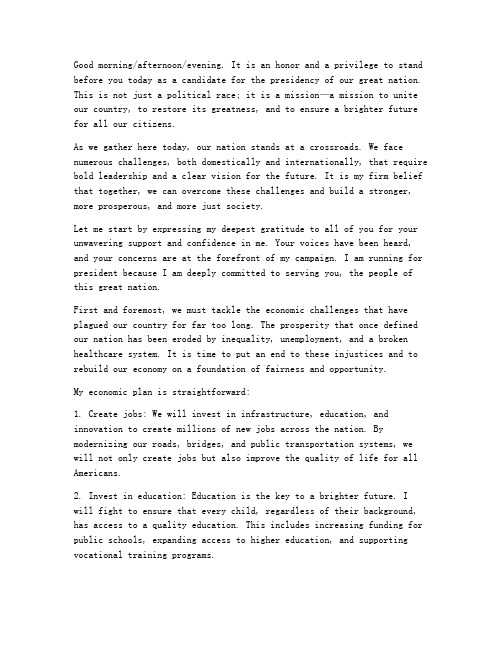
Good morning/afternoon/evening. It is an honor and a privilege to stand before you today as a candidate for the presidency of our great nation. This is not just a political race; it is a mission—a mission to unite our country, to restore its greatness, and to ensure a brighter future for all our citizens.As we gather here today, our nation stands at a crossroads. We face numerous challenges, both domestically and internationally, that require bold leadership and a clear vision for the future. It is my firm belief that together, we can overcome these challenges and build a stronger, more prosperous, and more just society.Let me start by expressing my deepest gratitude to all of you for your unwavering support and confidence in me. Your voices have been heard, and your concerns are at the forefront of my campaign. I am running for president because I am deeply committed to serving you, the people of this great nation.First and foremost, we must tackle the economic challenges that have plagued our country for far too long. The prosperity that once defined our nation has been eroded by inequality, unemployment, and a broken healthcare system. It is time to put an end to these injustices and to rebuild our economy on a foundation of fairness and opportunity.My economic plan is straightforward:1. Create jobs: We will invest in infrastructure, education, and innovation to create millions of new jobs across the nation. By modernizing our roads, bridges, and public transportation systems, we will not only create jobs but also improve the quality of life for all Americans.2. Invest in education: Education is the key to a brighter future. Iwill fight to ensure that every child, regardless of their background, has access to a quality education. This includes increasing funding for public schools, expanding access to higher education, and supporting vocational training programs.3. Reform the tax code: We will implement a fair and progressive tax system that rewards hard work and entrepreneurship while closing loopholes that allow the wealthy to exploit the system. This will ensure that everyone pays their fair share and that the tax burden is distributed more equitably.4. Strengthen healthcare: Access to affordable, quality healthcare is a fundamental right. I will fight to reform our healthcare system, ensuring that all Americans have access to comprehensive coverage without the fear of financial ruin.Secondly, we must address the issues of social justice and equality that divide our nation. Racism, discrimination, and inequality have no place in a society that prides itself on freedom and equality for all. It is my commitment to work tirelessly to bridge the gaps that separate us and to create a society where every individual has the opportunity to thrive.My social justice plan includes:1. Combating systemic racism: We will implement policies that address the root causes of racial disparities, including fair hiring practices, equitable law enforcement, and criminal justice reform.2. Supporting women's rights: We will fight for equal pay, reproductive rights, and access to education and employment opportunities for women. It is time to recognize the invaluable contributions that women make to our society and to ensure that they have the same opportunities as their male counterparts.3. Protecting LGBTQ+ rights: We will work to end discrimination against the LGBTQ+ community, ensuring that all individuals are treated with dignity and respect. It is our responsibility to protect the rights of all minorities and to create a society where everyone feels safe and accepted.4. Ensuring equal opportunities: We will fight to close the achievement gap, provide affordable housing, and ensure that every American has access to quality healthcare, education, and employment opportunities.Moving forward, we must also address the growing threats to our national security and the environment. In an increasingly interconnected world, we must stand united in our commitment to protect our nation and to combat the existential threat of climate change.My national security and environmental plan includes:1. Strengthening our military: We will invest in our military to ensure that our nation is prepared to face any challenge. This includes modernizing our arsenal, improving our intelligence capabilities, and supporting our veterans.2. Combating terrorism: We will work with our allies to dismantle terror networks and to prevent the spread of radical ideologies. It isessential that we stand together in the fight against terrorism and to promote peace and stability around the globe.3. Addressing climate change: We will prioritize environmentalprotection and commit to reducing greenhouse gas emissions,transitioning to renewable energy sources, and protecting our natural resources for future generations.4. Promoting global cooperation: We will engage with the international community to address global challenges, including trade agreements, human rights, and the proliferation of weapons of mass destruction.In conclusion, my vision for our nation is one of unity, progress, and prosperity. We must come together as a nation, transcending our differences, to build a future that is brighter, fairer, and more just for all.As your president, I will work tirelessly to achieve these goals. I will listen to your voices, I will fight for your interests, and I will never settle for anything less than excellence.Together, we can make our nation great again. Together, we can create a future that we can all be proud of.Thank you for your support, and may God bless the United States of America.God bless you all.。
绵阳市南山中学2021届高三下学期开学考试 英语试题(含答案)
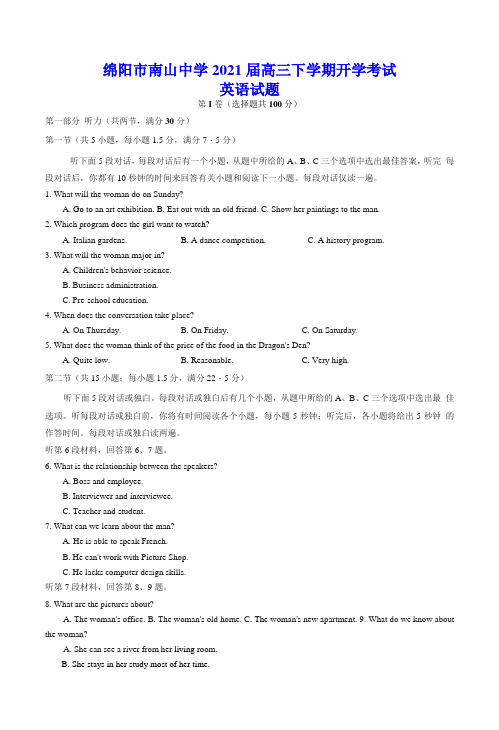
绵阳市南山中学2021届高三下学期开学考试英语试题第I卷(选择题共100分)第一部分听力(共两节,满分30分)第一节(共5小题,每小题1.5分,满分7・5分)听下面5段对话,每段对话后有一个小题,从题中所给的A、B、C三个选项中选出最佳答案,听完每段对话后,你都有10秒钟的时间来回答有关小题和阅读下一小题。
每段对话仅读一遍。
1. What will the woman do on Sunday?A. Go to an art exhibition.B. Eat out with an old friend.C. Show her paintings to the man.2. Which program does the girl want to watch?A. Italian gardens.B. A dance competition.C. A history program.3. What will the woman major in?A. Children's behavior science.B. Business administration.C. Pre-school education.4. When does the conversation take place?A. On Thursday.B. On Friday.C. On Saturday.5. What does the woman think of the price of the food in the Dragon's Den?A. Quite low.B. Reasonable.C. Very high.第二节(共15小题;每小题1.5分,满分22・5分)听下面5段对话或独白。
每段对话或独白后有几个小题,从题中所给的A、B、C三个选项中选出最佳选项。
听每段对话或独白前,你将有时间阅读各个小题,每小题5秒钟;听完后,各小题将给出5秒钟的作答时间。
- 1、下载文档前请自行甄别文档内容的完整性,平台不提供额外的编辑、内容补充、找答案等附加服务。
- 2、"仅部分预览"的文档,不可在线预览部分如存在完整性等问题,可反馈申请退款(可完整预览的文档不适用该条件!)。
- 3、如文档侵犯您的权益,请联系客服反馈,我们会尽快为您处理(人工客服工作时间:9:00-18:30)。
TABLE OF CONTENTS
Chapter 1 The Primary Functions of the State Chapter 2 The Function of Politics Chapter 3 Central And Local Politics Chapter 4 The Function of Administration Chapter 5 The Effect of the Administrative
Recently, however, writers on administration have seen that, from the point of view both of theoretical speculation and of practical expediency, administration should not be regarded as merely a function of the executive authority. It has been seen that administration is, on the contrary, the function of executing the will of the state.
The use of the word “administration” in this connection is unfortunately somewhat misleading. When administration used as indicative of function, is apt to promote the idea that this function of government is to be found exclusively in the work of what are commonly referred to as executive or administrative authorities. These in their turn are apt to be regarded as confined to the discharge of function of administration.
The Century Dictionary speaks of ‘administration’ as: ‘the duty or duties of the administrator; specifically, the executive functions of government, consisting in the exercise of all the powers and duties of government, both general and local, which are neither legislative Dictionary defines “politics”: In the narrower and more usual sense, the act or vocation of guiding or influencing the policy of a government through the organization of a party among its citizens.
Harmony between the expression and execution of the state will
Moderate centralization of administration American’s way-Party regularity Governmental system reform
Chapter 7 Popular Government Chapter 8 The Boss Chapter 9 Responsibility of Parties Chapter 10 Conclusions
The further statements of Wilson’s administrative theory
Goodnow’s PoliticsAdministration Dichotomy
Frank J. Goodnow (1859-1939) offered the politics- administration dichotomy in his book, politics and administration, published in 1900. Goodnow, one of the founders and first president (in1903) of the American Political Science Association, was one of the most significant voices and writers of progressive reform movement.(美国市政管理体制运动)
System on the Relation of Politics And Administration
Chapter 6 The Influence of the Governmental, and Particularly of the Administrative System on the Position of the Political Party
The further statements of Wilson’s administrative theory
These two functions of government may for purposes of convenience be designated respectively as Politics and Administration. Politics has to do with politics or expressions of the state will. Administration has to do with the execution of these policies.
